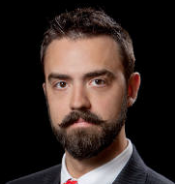Industry Insights
December 11, 2017
Mentkowski: Opioid Cases Consolidated Into MDL
- National
- - Popular with: Legal
- - 0 shares
After considering a motion brought by the plaintiffs in 46 actions pending in nine federal districts across the country, the Judicial Panel on Multidistrict Litigation (MDL) entered an order on Tuesday, transferring those actions to the Northern District of Ohio for coordinated or consolidated pretrial proceedings.

Timothy S. Mentkowski
The cases represent only a fraction of those filed against the numerous manufacturers of prescription opioid medications recently. Centralization will likely swell what has already been a deluge of claims against the drugmakers.
The vast majority of cases filed to date have been brought by governmental plaintiffs — states, counties and municipalities — but the filing of claims by third-party payers has begun to pick up speed as well. The order does not confirm whether opioid lawsuits brought by employee benefits plans and insurers will also be centralized in the MDL (In Re: National Prescription Opiate Litigation, MDL No. 2804).
At least one third-party payer plaintiff, Philadelphia Teachers Health and Welfare Fund, opposed centralization. The fund, whose case is currently pending in the Eastern District of Pennsylvania, advised the panel that it intends to file a motion for centralization of third-party payer claims in a separate MDL.
The panel advised that it will address that motion, if it is filed, in due course. Given that one of the bases for centralization of the moving parties’ actions is that they are all cities, counties and states with similar claims, centralization of third-party payer claims in the same MDL may not be appropriate. Further, the amount of third-party payer cases is almost certain to grow rapidly over the coming year, and the likelihood that different issues will arise relating to those — as opposed to the city, county, and state claims — separate consolidation may be more prudent.
Either way, the current movement toward large-scale litigation against pharmaceutical companies that have harvested massive profits from the sale and distribution of opioids presents a good opportunity for the insurers, benefit plans and other third-party payers that have borne the cost of the consequences.
Unless and until Philadelphia Teachers Health and Welfare Fund or other third-party payer(s) move to consolidate, the status of third-party payer claims is somewhat in flux. In all likelihood, the question will not go unanswered for long.
As for the city, county, and state cases in general, consolidation and coordination is certain.
Timothy S. Mentkowski is a senior associate attorney with the Matthiesen, Wickert & Lehrer law firm in Hartford, Wisconsin. This blog post is reprinted with permission.
Advertisements
Columns
- Montgomery: Sedgwick Tries PPO Discount for Med-Legal (Again) 04/19/24
- Kamin: More Policy Exclusions Would Reduce Losses 04/18/24
- Phillips: It's All Settled 04/17/24
- Snyder: Public Benefit Rules Have Changed, but It Might Not Make a Difference 04/12/24
- Headrick: Clearing Up a Common Misconception 04/11/24
- Snyder: Litigation Guidelines Should Define Four Settlement Triggers 04/10/24
- Kirsch: Depositions of Comp Carrier Employees After Intervening in Third-Party Actions 04/09/24
- Wilson and Bennett: Could AI Have Prevented the Opioid Crisis in Workers' Comp? 04/08/24
- Moore: Pandemic Effect Over in March 2027. Really? 04/05/24
- Geaney: A Brief History of Our State's Workers' Compensation Act 04/04/24
- Kamin and Larres: Significant Panel Decision Clarifies Recon Confusion 04/03/24
- Gelman: Exposed to 'Forever Chemicals' 04/02/24
- Montgomery: Cyberattack Delays Payment of San Francisco Bills 04/01/24
- Young: Indoor Heat Regs in Turmoil 03/29/24
- Langham: Shootings and Compensability 03/27/24
- Geaney: Third-Party Liens Not Always Due Right Away 03/26/24
- Larres: State Supreme Court Denies Review of Our Appellate Win 03/25/24
- Moore: Recordkeeping and Your Remote Premium Auditor 03/22/24
- Switzer: Important Change Coming Soon 03/21/24
- Moore: Basic AI Claims Adjuster Assistant Works Well 03/19/24
Now Trending
- Workers' Compensation News
-
Calif.
Chiropractor Sentenced to More Than
54 Years, Fined…
Posted on Apr 16, 2024
-
Calif. Court
Upholds Summary Dismissal of
Worker's Claims for Retaliation,…
Posted on Apr 17, 2024
-
Calif. Contractor
Pleads Guilty to Underreporting…
Posted on Apr 15, 2024
-
Calif. WCIRB
Approves Recommendation for 0.9%
Rate…
Posted on Apr 18, 2024
-
Calif. Committee
Passes Bill to Revise Poster…
Posted on Apr 19, 2024
-
Ill. Worker Who
Repeatedly Failed to Appear at
Hearings Can't Get Claim…
Posted on Apr 15, 2024
-
Fla. State Joins
Texas in Prohibiting Local
Workplace Safety…
Posted on Apr 16, 2024Joe Paduda says: “All of us in the Worker’s Comp. industry should push to improve…”
-
Neb. Lawmakers
Send Schedule Rating Bill to…
Posted on Apr 15, 2024
-
N.Y. Court: Worker
Should Have Been Denied Leave to
File Late…
Posted on Apr 17, 2024
-
La. Court
Overturns PTD Award for Worker With…
Posted on Apr 17, 2024
Jobs
Upcoming Events
May 5-8, 2024
Risk World
Amplify Your Impact There’s no limit to what you can achieve when you join the global risk managem …
May 13-15, 2024
NCCI's Annual Insights Symposi
Join us May 13–15, 2024, for NCCI's Annual Insights Symposium (AIS) 2024, the industry’s premier e …
May 13-14, 2024
CSIA Announces the 2024 Annual
The Board of Managers is excited to announce that the CSIA 2024 Annual Meeting and Educational Con …
Social Media Links
c/o Business Insurance Holdings, Inc.
Greenwich, CT 06836





No Comments
Log in to post a comment